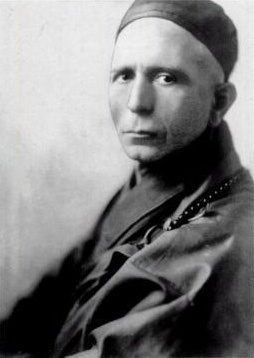Adós vagyok még a konklúzóval, hogy akkor mégis miben vagy mennyire buddhista Csao Kung apát-Trebitsch. Ígérem, megírom magyarul is, de addig itt egy összefoglalás angolul, mert kellett valahová. (A lábjegyzetek beszerkesztését most kihagynám.)
The Buddhism of The Greatest Adventurer of the 20th Century[1]
In my MA thesis[2] I made an attempt to reconstruct the Buddhism of Ignatius Timothy Trebitsch Lincoln/Abbot Chao Kung (1879, Paks, Hungary – 1943, Shanghai, China)[3] based on his collection of essays titled Dawn or Doom of Humanity[4]. I examined his biographies[5], especially the events that could shape his view on Buddhism, and looked at his comments on his own Buddhist practice. I was curious to learn which elements of Buddhism he uses in his writings and sayings, and to what extent these elements reflect his Western cultural background and/or his circumstances in the East (Ceylon and China). To be able to answer these questions I examined who the authorities and what the authoritative texts were for Trebitsch (to cite directly or indirectly), how he used the paradigm of East-West dichotomy in his essays and what his vision was about the role of Buddhism in the future of mankind. In my analysis I applied Stephen Batchelor’s scheme of the Western approach to Buddhism, dividing Trebitsch’s Buddhism into 3 aspects: "rational knowledge", "romantic fantasy" and "existential engagement".
In his essay collection Trebitsch addresses all mankind and especially the "leaders of the world". He discusses various issues such as foreign politics, education, leadership, the press, local vs. universal solutions to the world’s problems etc.. The book also contains a more metaphysical article entitled The Enigma of Life. In these pamphlets he claims that the Buddha’s teaching is the means to save mankind from the approaching war (and from all other perils of life).
Although (according to all his biographers) he learnt the Pali language within 2 weeks[6] he cites from the Kaccānagotta Sutta (SN 12.15) most probably quoting Georg Grimm, but definetely a Western source, without any reference to the title or number of the sutta[7], and he (mis)quotes verses 131-132 from the Dhammapada. Besides direct Buddhist sources he cites Georg Grimm, Lao Tzu[8], and the Theosophist Master K.H. (Kuthumi). So rather than drawing from the Pali (or the Chinese) Canon, Trebitsch relies on texts known in Western intellectual circles, not distinguishing between Buddhism, Taoism and Theosophy, which may itself be a Theosophist perspective.
He considers Buddhism a religion without ceremonies or prayers[9], a rational approach to life’s problems[10], and he emphasizes the scientific[11] and intellectual nature of the teachings of the Buddha. Trebitsch depicts Buddhism as progressive, tolerant, and available to everyone regardless of religion, race and stand. This later notion forms the basis of the existential engagement that he proposes. By changing one’s lifestyle (e.g. becoming vegetarian) and one’s habitual actions (e.g. recognizing greed, lying etc.), anyone can contribute to "the Fraternity of All Men"[12] and to a world with less suffering. Not only is this perfect world a romantic fantasy, but Trebitsch takes the Romantic East-West dichotomy for granted as well. He claims that all the (intuitive) wisdom has been preserved in the East, and the West has yet to learn to see through the veil of illusions[13] in order to find the Transcendent/the Truth – not only in the outside world, but also inside. Trebitsch here cites Grimm again[14], claiming that beyond the changing world of the 5 aggregates (skandhas) there is an eternal, non-material Self. Though Grimm and Trebitch regard it as the most essential doctrine of the Buddha, this theory of a Transcendent Self seems to be much closer to Theosophy than to the Buddha’s teaching (especially in the Pali Canon).
In summary it can be stated that Trebitsch/Chao Kung’s Buddhism stands closer to Theosophy than to the original teachings of the Buddha, but he utilizes all that he considers as Buddhism for an undoubtedly Buddhist goal: to reduce the suffering in the world. Therefore, his essays and biographies may be of interest for further research as he appears to be a forefather of what is now called "Engaged Buddhism", which sees the teachings of the Buddha as a means to a happier life on individual, social and even global levels.
[1] allusion to the title of Trebitsch’s autobiography Der grösste Abenteuer des XX. Jahrhunderts? : die Wahrheit über mein Leben (1931, Zürich : Amalthea Verlag)
[2] written in 2009 at the Gate of Dharma Buddhist University of Budapest, Hungary
[3] Ignác Trebitsch was supposed to become a rabbi in Paks, Hungary, but he lived as a Presbyterian missionary in Canada, an Anglican priest and a British MP, then an international spy travelling around the world, a Buddhist monk and finally an abbot of a Buddhist temple in Shanghai. He had close and controversial connections to the Theosophical Society and some of the prominent German Buddhists of his time: Georg Grimm and Martin Steinke. He dedicated his book Dawn or Doom of Humanity to Miklós Horthy, Governor of Hungary, in the hope of returning to his homeland and founding a monastery there.
[4] published in 1937, in Shanghai by The Shanghai Times
[5] by Wasserstein, Gömöri and Richard B. Spence
[6] in a monastery 10 km from Colombo in 1925
[7] p. 210-211
[8] the original spelling of Trebitsch
[9] most probably influenced by the Protestant Buddhism in Ceylon
[10] p. 231
[11] Trebitsch (following Grimm) uses scientific terms for certain Buddhist concepts (e.g. ’organic processes’ for saṃskārā)
[12] one of the principles of Theosophy
[13] i.e. the working of our culture/civilisation
[14] p. 206, 214
For more information contact me: veronika[dot]mathe[at]gmail[dot]com


